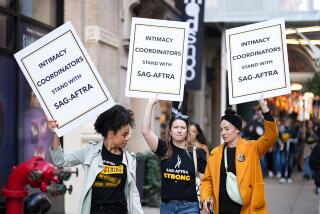Teamster Watchdogs Are Too Vigilant
- Share via
The symbolism is blatant: The last Teamsters Union convention was a tightly controlled one, held in “Sin City”--Las Vegas--in 1986.
This year the union, badly split as leaders democratically struggle for power, will open its 1991 convention June 24 at family-oriented Walt Disney World in Orlando, Fla.
Last time, I and about a dozen other reporters were bullied by hefty union “guards” as we tried to interview delegates. This time, a small army of 300 or more reporters--the largest number to attend any union convention--have been welcomed to describe the union’s new look.
This time, fractious delegates are expected to freely debate the future of their embattled union as candidates appeal for votes from the 1.4 million members in the union’s first rank-and-file election for top officers under the close supervision of a court-appointed administrator, Michael Holland.
Last time, Diana Kilmury, an articulate foe of the late Jackie Presser, then the union president, was shouted down by most of the 2,000 delegates. The few other dissidents were given the same ugly treatment.
This time, Kilmury, from Vancouver, is a candidate for vice president, running with Ron Carey, a reform candidate seeking the presidency. Kilmury, Carey and his other supporters have a chance of winning, and they probably won’t be screamed at by the delegates.
Last time, the delegates overwhelmingly elected Presser president, even though he was facing federal racketeering and embezzlement charges. He died before his trial.
Joseph Trerotola, an East Coast vice president, then hosted a magnificent feast for the 300-pound Presser, who was cheered by convention delegates as he was carried around the Caesars Palace ballroom on a sedan chair held by four local weightlifters dressed as Roman centurions.
This time, “Joe T” faces charges of continued association with known members of organized crime. He may be ousted from the union by the administrators.
The dramatic changes in the union are because of a 1989 agreement between the Justice Department and the union’s top officers that allowed a federal judge to name three outside administrators to supervise all union activities.
They are doing a superb job of ridding the union of mob-tainted officers and assuring honest elections of delegates to the union’s convention, which outweighs their faults.
But they haven’t been careful enough with their enormous power that gives them authority not only to investigate alleged mob influence on the union but also to use fines, suspension or expulsion to punish those they decide are guilty.
The very legal procedure that they used to bring democracy to the Teamsters is itself dangerous because it puts the government and the courts in charge of an entire union, which is an anathema in a free society.
The administrators’ mistakes raise a serious question: Where should they draw the line between their admirable war against mobsters--which should be their major goal--and micro-managing activities of union officers who have no ties to the underworld?
For example, one administrator, Charles Carberry, acted legally when he filed relatively minor charges recently against a Southern California candidate for a high Teamsters Union post, but his timing was unfortunate, if not downright unfair.
Michael Riley, head of the union in Southern California and a vice president of the international who is seeking reelection, was accused of “double dipping” into a union car allowance, failing to act against an allegedly corrupt local leader and improperly allowing some union staff members to keep their union-paid cars when they retired.
Of more concern than those charges are the high salaries legally paid to most Teamster leaders, including Riley. They are less than the obscenely high corporate executive salaries, but far above those of any other union leader in the world.
Riley, far from the top earner in the Teamsters, gets $218,000 a year as president of the union’s 135,000-member Southern California Joint Council, international vice president and head of Los Angeles-based Local 986. He also gets more than $20,000 a year in expenses.
Riley insists that he earns his salaries, and he vehemently denies the allegations made against him by the administrator.
But he won’t get his “trial” before one of the administrators until June 12, just 12 days before the union convention opens, and no final ruling is expected for several months.
Meanwhile, though, candidates for top offices, including Riley, will be nominated at the convention, and an already bitter election campaign among rival forces will have intensified.
Neither the administrators nor the Justice Department are accusing Riley of links to mobsters, and there are no hints that he has any.
But the charges against him could have a major impact on his bid for reelection as a vice president and on the other candidates on his slate, including front-runner R. V. Durham, who is seeking the presidency.
The administrators argue that their court mandate is to investigate any allegations of corruption, no matter how minor, and they think that while Riley’s alleged offenses may have been relatively small, they might still constitute corruption.
But in this and other cases, they have crossed the narrow line that should divide their impressive effort to break mob influence on the Teamsters and the right of the union to handle its own affairs, including the right to discipline those accused of misdeeds totally unrelated to the underworld.
The task of disciplining leaders such as Riley, if any is really needed, should be left to officers elected by members in the scrupulously monitored election. The danger is that the court-appointed administrators seem to be carried away with their power.


